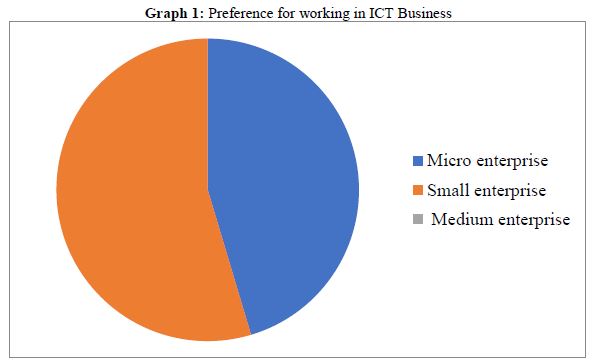Evaluating Women Participation in Information and Communication Technology (ICT) among MSME’s in Zambia; A Case Study of CBD, Lusaka
DOI:
https://doi.org/10.5281/zenodo.11101398Keywords:
women participation, micro, small, and medium enterprises, information and communication technologyAbstract
The purpose of this study was to evaluate women participation in Information and Communication Technology (ICT) among Micro, Small and Medium Enterprises (MSMEs) in Zambia; a case study of the Central Business District (CBD) of Lusaka. Employing a mixed-methods research approach, the study carried out comprehensive analysis of the data sourced from questionnaires and interviews in which the respondents were females running a business in Lusaka. The findings illustrate the prevalence of women’s participation in ICT, identifies the factors influencing women involvement in ICT and the strategies that can be used to promote participation among women MSMEs in ICT. The study used the Technological-Organization-Environment (TOE) framework as the conceptual framework. Using this theory, the author formulated variables under the categories; economic factors, socio-cultural factors, educational factors and the policy interventions from the government. The analysis was done using the Statistical Package for Social Sciences (SPSS) version 27. The results of the study revealed that there are few women participating in ICT domain among MSME’s in Lusaka. The study further showed that 24.7% of the females operated micro enterprises while 75.3% are operating as small enterprises and none are operating as medium enterprises as per definition provided in the MSME’s development policy of 2008. Some of the factors that were identified as affecting the participation of women in ICT among MSMEs according to the study include limited access to necessary equipment, lack of empowerment, and lack of public understanding of the industry by the public. The study recommended promoting STEM education among women, promoting mentorship programs and for the government to increase funding towards empowering women that want to establish businesses in the ICT sector.
Downloads
References
Aleke Ojiako, & Wainwright. (2011). ICT adoption in developing countries: Perspectives from small-scale agribusinesses. Journal of Enterprise Information Managemen, 24(1), 68-84.
Brush C., de Bruin A., & Welter F. (2019). A gender-aware framework for women's entrepreneurship. International Journal of Gender and Entrepreneurship, 4(3), 201-218.
Denscombe, M. (2014). The good research guide: For small-scale social research projects, s.l.: McGraw.
Dube J.-P., & Puneet, M. (2021). Success in high-technology markets: Is marketing capability critical?. Marketing Science, 18(4), 547-68.
Kanakulya J. M., Ruhinda J., & Musenze G. S. (2020). Impact of e-commerce on women empowerment: A case of women entrepreneurs in Zambia. Internation Journal of Scientific and Research Publications, 10(5), 104-112.
Kothari, T. (2004). Research design, s.l.: s.n.
Ndhlovu L. M., & Nkhoma M. (2018). Women in information and communication technology (ICT) in Zambia: The Role of Education.. International Journal of Higher Education, 7(4), 101-112.
Papastathopoulos A., & Beneki C. (2010). Does entrepreneurial experience and strategy really matter for ICT performance? A greek cross-border empirical study. The Electronic Journal Information Systems Evaluation, 13(2), 177-186.
Rubin H. J., & Rubin I. S. (2012). Qualitative interviewing: The art of hearing data. Sage.
Sichone, O. F. (2016). Rural women entrepreneurs in Zambia: Challenges and opportunities. Journal of International Women's Studies, 17(4), 161-175.
Simukonda, C. (2018). Women in e-commerce: A case study of Lusaka, Zambia. Journal of Global Entrepreneurship Research, 8(1), 19.
Smith J. A., Flowers P., & Larkin M. (2009). Interpretative phenomenological analysis: Theory, method, and research. Sage publications.
United Nations. (2020). Transforming our world: The 2030 agenda for sustainable development. Retrieved from: https://sdgs.un.org/2030agenda.
World Bank. (2020). World development report 2020: Trading for development in the age of global value chains. Washington, DC: World Bank.
World Bank. (2021). Women, business, and the law 2021: Exploring new frontiers. Retrieved from: https://openknowledge.worldbank.org/bitstream/handle/10986/34352/9781464816421.pdf.
World Economic Forum. (2020). Global gender gap report 2020. Retrieved from: http://www3.weforum.org/docs/WEF_Global_Gender_Gap_Report_2020.pdf.
ZICTA. (2020). National ICT policy. Zambia information and communications technology authority. Retrieved from: https://www.zicta.zm/sites/default/files/publications/Policy-Documents/National%20ICT%20Policy%20Final%20-%20Aug%202020.pdf.
Zulu, J. M. (2015). Entrepreneurial intention and entrepreneurial orientation of women in Zambia. Journal of Women's Entrepreneurship and Education, 1-2, 92-108.

Downloads
Published
How to Cite
Issue
Section
License
Copyright (c) 2024 Muka Bwato

This work is licensed under a Creative Commons Attribution 4.0 International License.
Research Articles in 'Management Journal for Advanced Research' are Open Access articles published under the Creative Commons CC BY License Creative Commons Attribution 4.0 International License http://creativecommons.org/licenses/by/4.0/. This license allows you to share – copy and redistribute the material in any medium or format. Adapt – remix, transform, and build upon the material for any purpose, even commercially.









